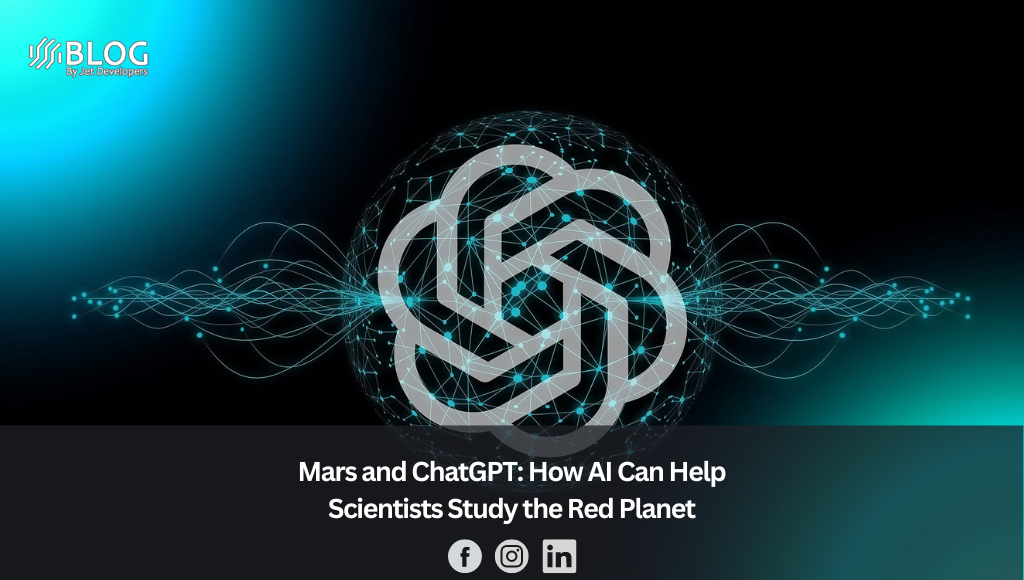As humanity sets its sights on exploring Mars, the integration of artificial intelligence (AI) is emerging as a powerful ally for scientists studying the enigmatic Red Planet.
Among the AI tools capturing widespread attention is ChatGPT, an advanced language model developed by OpenAI. With its ability to comprehend complex queries and generate human-like text responses, ChatGPT could even help revolutionize our understanding of Mars, assisting researchers in analyzing data, providing real-time insights, and even contributing to the publication of scientific findings.
Imagine a scenario where advanced AI algorithms, fueled by extensive training on vast amounts of data, work “hand in circuit” with cutting-edge scientific instruments. Together, they could analyze the alien terrain, interpret complex data, and assist in understanding Mars’ enigmatic past and present.

This remarkable collaboration between human intellect and machine learning has the potential to reshape our knowledge of the universe beyond Earth. While this scenario may sound like science fiction, leading researchers have started contemplating its feasibility and potential implications.
The benefits of ChatGPT extend beyond its ability to analyze data and provide real-time insights. This AI companion can assist in automating repetitive tasks, allowing scientists to focus their energy on more complex and intellectually demanding endeavors.
ChatGPT could also free up time and mental resources by shouldering the burden of routine work and empowering researchers to delve deeper into the mysteries of the Red Planet.
Moreover, the integration of ChatGPT on missions to Mars holds the promise of accelerating scientific progress. With its vast knowledge base and processing power, scientists can more efficiently explore and evaluate many hypotheses and theories. This AI-driven analysis could lead to groundbreaking discoveries, reshape our understanding of Mars’ geological history, and even shed light on the potential for past or present life on the planet.
However, like any tool, using ChatGPT for this purpose is not without its challenges and limitations. Many researchers argue that its accuracy can not be assumed, particularly in the complex and dynamic Martian environment, necessitating regular human intervention and expertise. In addition, in an unforgiving environment like space, where lives hang in the balance, having an AI that hallucinates or makes up information would be a considerable risk. Striking a balance between human guidance and AI assistance would be crucial to ensuring the reliability and integrity of any scientific exploration.
Challenges of ChatGPT AI in Mars Eexploration
Not everyone is convinced of the efficacy of complete reliance on AI. Key AI and space exploration stakeholders have expressed skepticism and raised thought-provoking questions regarding using AI in studying the Red Planet and in space exploration itself. While AI, including ChatGPT, holds immense potential, these key stakeholders emphasize the importance of balancing human intellect and AI assistance.
From experts in innovation and technology management to seasoned researchers in Earth and space exploration, doubts have been raised regarding the accuracy and limitations of AI tools like ChatGPT, particularly in exploring Mars.
Sercan Ozcan, an innovation and technology management expert, warns of the limitations of ChatGPT’s accuracy and the potential for misleading information. He argues that human involvement and expertise are essential for areas where errors cannot be tolerated.
“It could be done, but there could be misleading information,” said Sercan Ozcan, adding, “ChatGPT is not 100% accurate, and it is prone to ‘hallucination.'”
Steve Ruff, an associate research professor focused on Mars exploration, also expresses skepticism about on-the-spot manuscripts generated solely by AI. He emphasizes the necessity of human interpretation and the involvement of scientific teams in analyzing and debating observations. Ruff acknowledges AI’s role in streamlining certain aspects, such as rover operations and navigation.
Ruff said, “My immediate reaction is that it’s highly unlikely that ‘on-the-spot’ manuscripts would be a realistic scenario given how the process involves debates among the team over the observations and their interpretation. I’m skeptical that any AI trained on existing observations could be used to confidently interpret new observations without humans in the loop, especially with new instrument datasets that have not been available previously. Every such dataset requires painstaking efforts to sort out.”
Another research expert, Nathalie Cabrol, director of the Carl Sagan Center for Research, recognizes the potential of AI as a valuable tool but raises concerns about its misuse and the potential erosion of human creativity and evolution. She emphasizes that AI should augment human activity rather than replace it entirely.
Amy Williams, a geological sciences expert involved in Mars rover missions, highlights the strengths and limitations of ChatGPT based on her experience. While it can provide robust summaries of existing knowledge, the model’s knowledge cutoff, hallucinations, and inability to incorporate recent data present challenges for generating complete and up-to-date scientific syntheses.
While AI and ChatGPT hold promise in aiding the study of Mars, experts’ opinions are divided. Some caution against over-reliance on AI, emphasizing the importance of human involvement and interpretation in the creative process. Others recognize the potential for AI to augment scientific endeavors but emphasize the need for careful integration and consideration of its limitations.
How can ChatGPT be used for Mars exploration?
Data analysis and interpretation:
Mars missions generate enormous data, ranging from atmospheric measurements to geological surveys. ChatGPT’s advanced natural language processing capabilities could enable it to analyze this vast information trove in some ways, identify patterns, and extract meaningful insights.
Mission planning and decision-making:
ChatGPT can contribute to optimizing mission planning and supporting decision-making processes. ChatGPT can provide recommendations based on scientific principles and historical mission data by leveraging its ability to process large datasets and evaluate various scenarios. This could assist scientists in making informed decisions that enhance mission efficiency and ensure the safety of astronauts and equipment.
Autonomous exploration:
Exploring the Martian landscape requires the deployment of autonomous rovers and drones capable of navigating the challenging terrain. Rovers and droves controlled by ChatGPT, combined with computer vision and machine learning algorithms, could facilitate autonomous navigation by aiding in analyzing landscapes, identifying obstacles, and making real-time decisions. ChatGPT could also aid in efficient data collection, including assisting in producing high-resolution images and in taking geological samples.
Climate and weather modeling:
ChatGPT could help analyze historical weather data, atmospheric conditions, and climate models. By predicting dust storms, temperature fluctuations, and other meteorological events, ChatGPT could assist scientists in optimizing power usage, scheduling activities, and ensuring the safety of missions on the Martian surface.
Image processing and geological analysis:
ChatGPT’s prowess in image processing and pattern recognition could allow scientists to automate the identification of geological features, analyze rock formations, and detect potential signs of life. In the future, ChatGPT might help accelerate the discovery process on Mars by rapidly processing and interpreting complex visual data.
Searching for signs of life:
Unraveling the mystery of whether Mars harbors or once harbored life is a primary objective of Martian exploration. ChatGPT could help scientists analyze complex data patterns that may indicate the presence of life, such as identifying biosignatures, analyzing chemical compositions, etc.
ChatGPT could be a dynamic companion in our quest to unravel Mars’s secrets, accelerating scientific discovery and igniting our imagination for the wonders that lie beyond.






